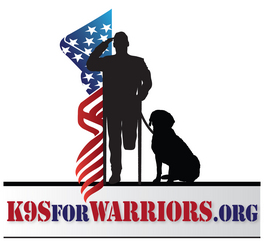Jaeckle, K9s for Warriors help veterans with PTSD

Now Flagler College assistant professor Tina Jaeckle and a group called K9s for Warriors are trying a different approach in the form of man’s best friend.
“When you come home, your dog knows when you’ve had a bad day,” said Jaeckle, who serves on the board of the Ponte Vedra Beach-based organization. “They want to get up in your lap. They want to cuddle. Dogs do that naturally. They’re much more sensitive to these things than humans.”
According to Jaeckle, who teaches sociology at Flagler, it’s that sensitivity to feelings such as fear and anxiety that make them perfect compliments to combat veterans suffering from PTSD.
According to a study by the Rand Corporation, one in five returning veterans suffers from Post-Traumatic Stress Disorder. One in six will attempt or commit suicide. Symptoms can include hostility, aggression, depression, suicide, paranoia, acrophobia, nightmares, panic attacks, poor coping skills, memory loss and lack of trust.
“My background as a clinical social worker has always been in crisis and trauma. It’s something I educate law enforcement on and first responders,” said Jaeckle. “Right now, (PTSD) is an epidemic and if we don’t figure out better ways to deal with this, we’ll have no idea what to do when all these folks come back home.”
In the K9s for Warriors program, service dogs, which are rescues from local shelters, are trained together with their matched veteran to establish a deep bond that will enable the dog to be able to sense when its owner is in danger.
Three to five veterans at any given time are put up at the facility for a three-week training program where the “warrior” learns the skills needed to train their own canines. The group provides a service canine, training, certification, equipment, seminars, vet care, most meals and housing free of charge.
Service dogs at the facility are trained to respond to these dangers by performing tasks to lessen the distress. Examples of these tasks include pawing or bringing a toy to break a disturbing episode, blocking an unwanted person from advancing too close, reminding the warrior to take medicine or nudging the warrior while thrashing due to a nightmare. Each warrior has differing symptoms, so his or her service dog is trained for his or her specific disabilities.
Sandi Capra serves as director of development for the K9s program, but her connection runs much deeper than that. Her husband graduated from the program in November of 2011.
“This program allows (veterans) to live a more normal life. They can go to shops, restaurants, movies, everyday things you and I take for granted they are no longer able to do due to the overwhelming symptoms of PTSD,” said Capra. “They start to interact with the public and relearn to trust and can become productive members of society once again.”
And since the group’s services are provided free of charge, financial help and volunteers are always needed.
“The cost to feed the warriors while they are in residence and the cost of dog supplies are a large expense for K9s,” said Capra. “Financial help is always appreciated.”
And the local facility and need for volunteers is a fact that Jaeckle says has played well with her students, who have had visits from several veterans who have graduated the program.
“I think there are numerous opportunities for students in sociology and psychology to study PTSD as well as a huge opportunity to help veterans,” said Jaeckle. “We’re talking about current and future trends in psychology and sociology that students can take with them to graduate school.”
For more information on K9s for warriors or to find out how you can help, visit k9sforwarriors.org
Source: Flagler College






















Leave a Reply
You must be logged in to post a comment.